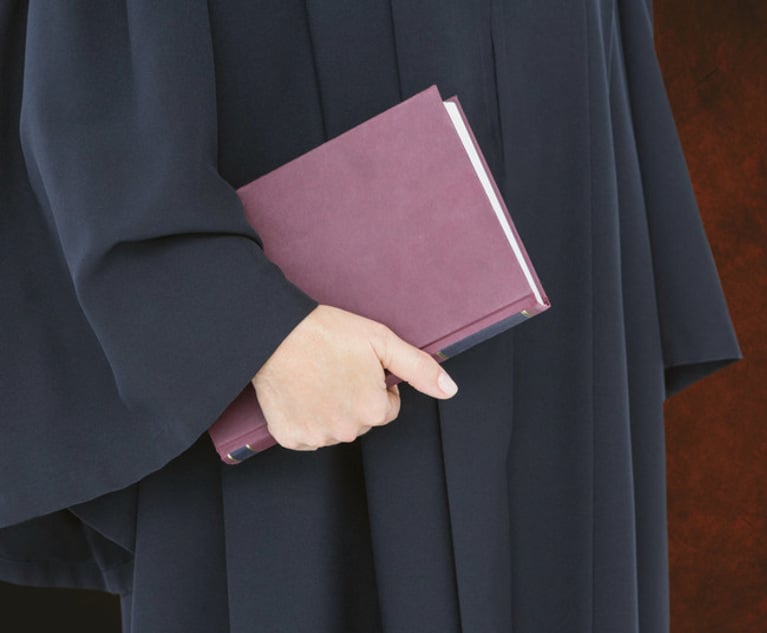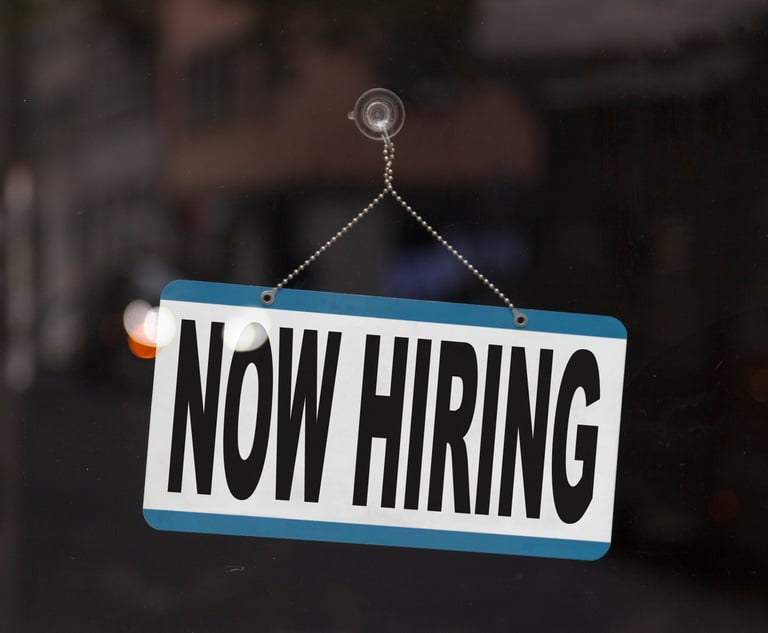 Fulton County Deputy Attorney Kaye Burwell (left) and Robert Ashe of Bondurant, Mixson & Elmore (Photos: John Disney/ALM)
Fulton County Deputy Attorney Kaye Burwell (left) and Robert Ashe of Bondurant, Mixson & Elmore (Photos: John Disney/ALM)Monster Land Dispute Alive at High Court—Again
"Frankenstein" is the name Robert Ashe III of Bondurant, Mixson & Elmore, representing the city of Atlanta, gave to the legislation that provides Fulton County's claim to the land in dispute.
October 11, 2018 at 11:27 AM
4 minute read
“Frankenstein” was back before the Georgia Supreme Court Wednesday. It's a monster case worth enough money for lawyers to keep bringing it back to life.
Atlanta and Fulton County have been fighting for years over who has the right to tax a 1.4-acre lot in an industrial park on the western side of the city that has far greater importance than the boarded-up bank building that sits there. City leaders have decided to use the land as a test case, according to the lawyer who argued for them last time the matter was decided by the high court two years ago and again Wednesday, Robert Ashe III of Bondurant, Mixson & Elmore. If Atlanta can establish the right to annex that one piece of land, it could theoretically annex—and tax—the entire industrial park. So millions of tax dollars annually forever are riding on the question.
Fulton County Deputy Attorney Kaye Burwell told the court Wednesday that the Georgia General Assembly gave the county the right to tax the land with the creation of the Fulton County Industrial District tax zone in 1979.
But Ashe countered that the constitutional amendment the county cites for its right to the property was invalid the day it passed because it combined different pieces of legislation. He likened it to the infamous monster made from stitched-together body parts.
“It's a Frankenstein,” Ashe said.
Two years ago, it looked like Ashe and the city had lost. The Supreme Court issued a unanimous opinion holding that the city of Atlanta was never on solid legal ground in seeking a declaratory judgment on its right to annex land that was part of the Fulton County Industrial District tax zone. Justice Keith Blackwell wrote that the trial court—Fulton County Superior Court Judge Gail Tusan—should have dismissed the city's lawsuit. Instead, Tusan granted the city's request to declare void the state legislation that created the county's industrial tax zone in 1979. The high court's decision returned the case to Tusan for dismissal.
“We are glad that the case has concluded and thank the Supreme Court for their work,” County Attorney Patrise Perkins-Hooker said at the time.
But the dispute wasn't dead after all.
The city released a statement noting Blackwell took issue with the city for inquiring whether the proposed annexation would be lawful before taking action. “The Supreme Court expressed no view as to the merits of the city's ultimate legal position that the (Fulton Industrial District) legislation is invalid. In light of this ruling, the City will evaluate its options going forward within the FID,” the city said.
In 2017, the city annexed the disputed land. In response, Fulton County sued in Fulton County Superior Court, challenging the annexation based on the 1979 local constitutional amendment. The county lost and appealed, bringing the case back to the Supreme Court.
Wednesday's oral arguments included debate on the validity of different versions of—and amendments to—the state constitution over the past 40 years, and a long discussion of the “single subject rule” for legislation. That interested brand new Justice Charlie Bethel, who served as Gov. Nathan Deal's floor leader in the Georgia Senate until Deal put Bethel on the bench—first in 2017 on the Court of Appeals and this month on the Supreme Court.
“The single subject rule is determined by how far away from the issue you stand, is it not?” Bethel asked Ashe.
Ashe answered that the legislation in question had unrelated measures tacked on. That's where he brought up Frankenstein.
Ashe finished his argument with time left on the clock, saying, “I'm going to reserve the rest of my time for the next time I'm here.”
The current incarnation of the case is Fulton County v. City of Atlanta, No. S181156.
This content has been archived. It is available through our partners, LexisNexis® and Bloomberg Law.
To view this content, please continue to their sites.
Not a Lexis Subscriber?
Subscribe Now
Not a Bloomberg Law Subscriber?
Subscribe Now
NOT FOR REPRINT
© 2025 ALM Global, LLC, All Rights Reserved. Request academic re-use from www.copyright.com. All other uses, submit a request to [email protected]. For more information visit Asset & Logo Licensing.
You Might Like
View All

Sanctions Order Over Toyota's Failure to Provide English Translations of Documents Vacated by Appeals Court
4 minute read
Burr & Forman, Smith Gambrell & Russell Promote More to Partner This Year
7 minute readTrending Stories
Who Got The Work
Michael G. Bongiorno, Andrew Scott Dulberg and Elizabeth E. Driscoll from Wilmer Cutler Pickering Hale and Dorr have stepped in to represent Symbotic Inc., an A.I.-enabled technology platform that focuses on increasing supply chain efficiency, and other defendants in a pending shareholder derivative lawsuit. The case, filed Oct. 2 in Massachusetts District Court by the Brown Law Firm on behalf of Stephen Austen, accuses certain officers and directors of misleading investors in regard to Symbotic's potential for margin growth by failing to disclose that the company was not equipped to timely deploy its systems or manage expenses through project delays. The case, assigned to U.S. District Judge Nathaniel M. Gorton, is 1:24-cv-12522, Austen v. Cohen et al.
Who Got The Work
Edmund Polubinski and Marie Killmond of Davis Polk & Wardwell have entered appearances for data platform software development company MongoDB and other defendants in a pending shareholder derivative lawsuit. The action, filed Oct. 7 in New York Southern District Court by the Brown Law Firm, accuses the company's directors and/or officers of falsely expressing confidence in the company’s restructuring of its sales incentive plan and downplaying the severity of decreases in its upfront commitments. The case is 1:24-cv-07594, Roy v. Ittycheria et al.
Who Got The Work
Amy O. Bruchs and Kurt F. Ellison of Michael Best & Friedrich have entered appearances for Epic Systems Corp. in a pending employment discrimination lawsuit. The suit was filed Sept. 7 in Wisconsin Western District Court by Levine Eisberner LLC and Siri & Glimstad on behalf of a project manager who claims that he was wrongfully terminated after applying for a religious exemption to the defendant's COVID-19 vaccine mandate. The case, assigned to U.S. Magistrate Judge Anita Marie Boor, is 3:24-cv-00630, Secker, Nathan v. Epic Systems Corporation.
Who Got The Work
David X. Sullivan, Thomas J. Finn and Gregory A. Hall from McCarter & English have entered appearances for Sunrun Installation Services in a pending civil rights lawsuit. The complaint was filed Sept. 4 in Connecticut District Court by attorney Robert M. Berke on behalf of former employee George Edward Steins, who was arrested and charged with employing an unregistered home improvement salesperson. The complaint alleges that had Sunrun informed the Connecticut Department of Consumer Protection that the plaintiff's employment had ended in 2017 and that he no longer held Sunrun's home improvement contractor license, he would not have been hit with charges, which were dismissed in May 2024. The case, assigned to U.S. District Judge Jeffrey A. Meyer, is 3:24-cv-01423, Steins v. Sunrun, Inc. et al.
Who Got The Work
Greenberg Traurig shareholder Joshua L. Raskin has entered an appearance for boohoo.com UK Ltd. in a pending patent infringement lawsuit. The suit, filed Sept. 3 in Texas Eastern District Court by Rozier Hardt McDonough on behalf of Alto Dynamics, asserts five patents related to an online shopping platform. The case, assigned to U.S. District Judge Rodney Gilstrap, is 2:24-cv-00719, Alto Dynamics, LLC v. boohoo.com UK Limited.
Featured Firms
Law Offices of Gary Martin Hays & Associates, P.C.
(470) 294-1674
Law Offices of Mark E. Salomone
(857) 444-6468
Smith & Hassler
(713) 739-1250







